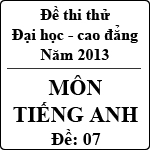Đề thi thử THPT Quốc gia 2017 môn Tiếng Anh trường THPT Ngô Gia Tự, Vĩnh Phúc – Lần 3 (Có đáp án), Tài Liệu Học Thi xin gửi đến các bạn thí sinh Đề thi thử THPT Quốc
Đề thi thử THPT Quốc gia 2017 môn Tiếng Anh
Đề thi thử THPT Quốc gia 2017 môn Tiếng Anh trường THPT Ngô Gia Tự, Vĩnh Phúc – Lần 3 (Có đáp án) là đề thi thử nghiệm THPT quốc gia 2017 dành cho các bạn thí sinh đang ôn thi THPT quốc gia 2017 tham khảo. Thông qua đề thi này giúp các bạn làm quen với cấu trúc đề thi trắc nghiệm môn Tiếng Anh đồng thời rèn luyện và nâng cao kỹ năng giải đề thi.
Đề thi thử THPT Quốc gia năm 2017 môn Tiếng Anh trường Đại học Ngoại Thương, Hà Nội (Lần 4)
| SỞ GD & ĐT VĨNH PHÚC TRƯỜNG THPT NGÔ GIA TỰ |
KỲ THI KSCL ÔN THI THPT QUỐC GIA LẦN III NĂM HỌC 2016-2017 Môn thi: Tiếng Anh |
Mark the letter A, B, C, or D on your answer sheet to indicate the word whose underlined part is pronounced differently from that of the rest in each of the following questions.
Question 1: A. thread B. breath C. break D. tread
Question 2: A. cooks B. loves C. spends D. joins
Mark the letter A, B, C, or D on your answer sheet to indicate the word that differs from the rest in the position of the main stress in each of the following questions.
Question 3: A. advantageous B. oceanic C. compulsory D. influential
Question 4: A. surrounding B. cultural C. discourage D. embarrass
Mark the letter A, B, C, or D on your answer sheet to indicate the underlined part that needs correction in each of the following questions.
Question 5: I had my motorbike repair yesterday but now it still doesn’t work.
A. had B. repair C. but now D. work
Question 6: The Oxford English Dictionary is well- known for including many different meanings of words and to give real examples.
A. The B. well- known C. to give D. meanings
Question 7: Aristotle systematically set out various forms of syllogism that has remained an important reference for logic.
A. systematically B. that C. various D. has remained
Mark the letter A, B, C or D on your answer sheet to indicate the correct answer to each of the following questions.
Question 8: I hope this headache will____________ soon.
A. pass away B. put away C. wear off D. go out
Question 9: Do you know the woman ______ lives next door?
A. whose B. who C. whom D. which
Question 10: It is a __________________.
A. polyester sleeping blue bag B. blue sleeping polyester bag
C. blue polyester sleeping bag D. sleeping blue polyester bag
Question 11: I can’t sleep ________ the hot weather.
A. because B. because of C. as D. since
Mark the letter A, B, C or D on your answer sheet to indicate the most suitable response to complete each of the following exchanges.
Question 20: – Lan: “How do you find Hanoi?” – Justin: “__________________”
A. Are you living here? B. I got a map from the tourist office.
C. It’s a beautiful city. D. Hanoi is the capital of Vietnam.
Question 21: Tom: “Why didn’t you pay the telephone bill?” Lucy: “______________.”
A. Yes, it was true B. Well, it’s too thick
C. I did D. Thank you for all that
Mark the letter A, B, C, or D on your answer sheet to indicate the word(s) CLOSEST in meaning to the underlined word (s) in each of the following questions.
Question 22: Suddenly, it began to rain heavily, so all the summer hikers got drenched all over.
A. refreshed B. completely wet C. very tired D. cleansed
Question 23: Corn, domesticated by the American Indians, was brought to Europe by Columbus.
A. cultivated B. trained C. implanted D. reared
Mark the letter A, B, C, or D on your answer sheet to indicate the word(s) OPPOSITE in meaning to the underlined word (s) in each of the following questions.
Question 24: Adverse reviews in the press may greatly change the prospects of a product.
A. Additional B. Favourable C. Sensible D. Encouraging
Question 25: You should put yourself on the back for having achieved such a high score in the graduation exam.
A. wear a backpack B. praise yourself C. check up your back D. criticize yourself
Mark the letter A, B, C, or D on your answer sheet to indicate the sentence that is closest in meaning to each of the following questions.
Question 26: Once the airline announced its ticket sale, the telephone in the main office would not stop ringing.
A. If the airline didn’t announce a ticket sale, its telephone would stop ringing.
B. Nobody called the airline until it announced its ticket sale.
C. People kept calling the airline main office since its announcement of ticket sale.
D. The airline telephone was ringing because they announced a ticket sale.
Question 27: People say he won a lot of money on the lottery.
A. He is said that he won a lot of money on the lottery.
B. He is said to have won a lot of money on the lottery.
C. He was said to win a lot of money on the lottery.
D. He won a lot of money on the lottery, it is said.
Question 28: “Do you believe in what the boy says, Mary?” said Tom.
A. Tom asked Mary whether she believes in what the boy says.
B. Tom said that Mary believed in what the boy said.
C. Tom asked Mary to believe in what the boy said.
D. Tom asked Mary if she believed in what the boy said.
Mark the letter A, B, C, or D on your answer sheet to indicate the sentence that best combines each pair of sentences in the following questions.
Question 29: The plan may be ingenious. It will never work in practice.
A. Ingenious as it may be, the plan will never work in practice.
B. The plan may be too ingenious to work in practice.
C. The plan is as impractical as it is ingenious.
D. Ingenious as may the plan, it will never work in practice.
Question 30: It doesn’t make any difference if it rain. They will still go.
A. Whether it rains or not, they will still go.
B. The difference is their going in the rain.
C. But for the rain, we would not have gone.
D. But for the rain, they would have gone.
Read the following passage and mark the letter A, B, C, or D on your answer sheet to indicate the correct word or phrase that best fits each of the numbered blanks.
Rock carvings suggest that Stone Age people were hunting whales for food as early as 2,200 B.C. Such (31)______ hunting is still practised today in a number of societies including the Inuit people of Greenland and North America. Whaling became big (32)_____________ from the seventeenth century as the demand for whale bone and whale oil rose, and the humpback and sperm whales were hunted in increasing large number. (33)_________ just as stocks of these species began to fall, the explosive harpoon gun was invented. This weapon, together with the development of steam-powered ships, enable the whaler to hunt the fast moving fin and blue whales. In 1905, the whaling (34)____________ moved the water of Antarctica. The introduction of massive factory ships enabled the whales to be processed at sea. As a result, the blue whale had virtually disappeared by the 1950s. In 1946, The International Whaling Commision was established to maintain the declining whale populations. Quotas were set but these were often ignored and the numbers continued to fall. Hunting of many species continued until 1986 when the IWC finally responded to international (35)____________ and a band on commercial whaling was introduced.
Question 31: A. basic B. survival C. subsistence D. essential
Question 32: A. finance B. commerce C. trade D. business
Question 33: A. but B. because C. because of D. therefore
Question 34: A. fleets B. lines C. troops D. staff
Question 35: A. pressure B. shame C. reputation D. volume
Read the following passage and mark the letter A, B, C, or D on your answer sheet to indicate the correct answer to each of the questions from 36 to 40.
Since water is the basis of life, composing the greater part of the tissues of all living things, the crucial problem of desert animals is to survive in a world where sources of flowing water are rare. And since man’s inexorable necessity is to absorb large quantities of water at frequent intervals, he can scarcely comprehend that many creatures of the desert pass their entire lives without a single drop.
Uncompromising as it is, the desert has not eliminated life but only those forms unable to withstand its desiccating effects. No moist- skinned, water-loving animals can exist there. Few large animals are found. The giants of the North American desert are the deer, the coyote, and the bobcat. Since desert country is open, it holds more swift-footed running and leaping creatures than the tangled forest. Its population is largely nocturnal, silent, filled with reticence, and ruled by stealth. Yet they are not emaciated.
Having adapted to their austere environment, they are as healthy as animals anywhere else in the word. The secret of their adjustment lies in the combination of behavior and physiology. None could survive if, like mad dogs and Englishmen, they went out in the midday sun; many would die in a matter of minutes. So most of them pass the burning hours asleep in cool, humid burrows underneath the ground, emerging to hunt only by night. The surface of the sun- baked desert averages around 150 degrees, but 18 inches down the temperature is only 60 degrees.
Question 36: The title for this passage could be__________.
A. Man’s Life in a Desert Environment B. Life Underground
C. Desert Plants D. Animal Life in a Desert Environment
Question 37: Man can hardly understand why many animals live their whole life in the desert, as________.
A. very few lager animals are found in the desert.
B. water is an essential part of his existence.
C. water composes the greater part of the tissues of living things.
D. sources of flowing water are rare in a desert.
Question 38: The phrase “those forms” in the passage refers to all of the following EXCEPT_________.
A. many large animals B. moist-skinned animals
C. water-loving animals D. the coyote and the bobcat
Question 39: According to the passage, creatures in the desert________.
A. are not as healthy as those anywhere else in the world
B. are more active during the day than those in the tangled forest
C. run and leap more slowly than those in the tangled forest
D. run and leap faster than those in the tangled forest
Question 40: The word “emaciated” in the passage mostly means__________.
A. large and strong, difficult to control or deal with
B. able to get what one wants in a clever way, especially by tricking or cheating
C. living or growing in natural conditions, not kept in a house or on a farm
D. thin and weak because of lack of food and water
Read the following passage and mark the letter A, B, C, or D on your answer sheet to indicate the correct answer to each of the questions from 41 to 50.
Until recently, most American entrepreneurs were men. Discrimination against women in business, the demands of caring for families, and lack of business training had kept the number of women entrepreneurs small. Now, however, businesses owned by women account for more than $40 billion in annual revenues, and this figure is likely to continue rising throughout the 1990s. As Carolyn Doppelt Gray, an official of the Small Business Administration, has noted, “The 1970s was the decade of women entering management, and the 1980s turned out to be the decade of the woman entrepreneur”. What are some of the factors behind this trend? For one thing, as more women earn advanced degrees in business and enter the corporateworld, they are finding obstacles. Women are still excluded from most executive suites. Charlotte Taylor, a management consultant, had noted, “In the 1970s women believed if they got an MBA and worked hard they could become chairman of the board. Now they’ve found out that isn’t going to happen, so they go out on their own”.
In the past, most women entrepreneurs worked in “women’s” fields: cosmetics and clothing, for example. But this is changing. Consider ASK Computer Systems, a $22-million-a-year computer software business. It was founded in 1973 by Sandra Kurtzig, who was then a housewife with degrees in math and engineering. When Kurtzig founded the business, her first product was software that let weekly newspapers keep tabs on their newspaper carriers-and her office was a bedroom at home, with a shoebox under the bed to hold the company’s cash. After she succeeded with the newspaper software system, she hired several bright computer-science graduates to develop additional programs. When these were marketed and sold, ASK began to grow. It now has 200 employees, and Sandra Kurtzig owns $66.9 million of stock.
Of course, many women who start their own businesses fail, just as men often do. They still face hurdles in the business world, especially problems in raising money; the banking and finance world is still dominated by men, and old attitudes die hard. Most businesses owned by women are still quite small. But the situation is changing; there are likely to be many more Sandra Kurtzigs in the years ahead.
Question 41: What is the main idea of this passage?
A. Women are better at small business than men are.
B. The computer is especially lucrative for women today.
C. Women today are opening more business of their own.
D. Women today are better educated than in the past, making them more attractive to the business world.
Question 42: The word “excluded” in the pasage is closest meaning to________.
A. not permitted in B. decorators of
C. charged admission to D. often invited to
Question 43: All of the following were mentioned in the passage as detriments to women in the business world EXCEPT__________.
A. Women lacked ability to work in business.
B. Women were not trained in business.
C. Women were required to stay at home with their families.
D. Women faced discrimination in business.
Question 44: in the passage, “that” refers to_________.
A. Women working hard
B. Women achieving advanced degrees
C. Women believing that business is a place for them.
D. a woman becomes chairman of the board.
Đáp án đề thi thử THPT Quốc gia 2017 môn Tiếng Anh

Question 1: Đáp án C
thread /θred/
breath /breθ/
break /breik/
tread /tred/
Question 2: Đáp án A
Phần A được phát âm là /s/, các phần còn lại là /z/
Có 3 cách phát âm phụ âm cuối “s” như sau:
– /s/:Khi từ có tận cùng là các phụ âm vô thanh /f/, /t/, /k/, /p/ , /ð/
– /iz/:Khi từ có tận cùng là các âm /s/, /z/, /∫/, /t∫/, /ʒ/, /dʒ/
– /z/:Khi từ có tận cùng là nguyên âm và các phụ âm hữu thanh còn lại
Question 3: Đáp án C
Phần C trọng âm rơi vào âm tiết thứ 2, còn lại là thứ 3
advantageous /ædvən’teidʒəs/
oceanic /,əʊ∫i’ænik/
compulsory /kəm’pʌlsəri/
influential /,influ’en∫l/
Question 4: Đáp án B
Phần B trọng âm rơi vào âm tiết thứ nhất, còn lại là thứ 2
surrounding /sə’raʊndiη/
cultural /’kʌlt∫ərəl/
discourage /di’skʌridʒ/
embarrass /im’bærəs/
Question 5: Đáp án B
“repair” => “repaired”
Cấu trúc: have something done (by somebody): có cái gì đó được làm (bởi ai đó) => bản thân ko thực hiện hành động mà có một người khác làm
Phân biệt với cấu trúc: have somebody do something: có cái đó làm cái gì (cho mình)
Dịch:
Tôi có chiếc xe đạp được sửa hôm qua nhưng bây giờ nó lại không hoạt động
Question 6: Đáp án C
“to give” => “giving”
Động từ give ở đây có chức năng giống động từ include, vì vậy phải chia dạng Ving như động từ include
Dịch:
Từ điển tiếng Anh Oxford nổi tiếng vì cung cấp nhiều nghĩa của từ và đưa ra nhiều ví dụ thực tế
Question 7: Đáp án D
“has remained” => “have remained”
Danh từ ở đây là various forms (số nhiều) cho nên trợ động từ không thể dùng là has, mà phải dùng là have
Dịch:
Aristotle đặt ra một cách có hệ thống các hình thức khác nhau của tam đoạn luận mà vẫn còn là một tài liệu tham khảo quan trọng cho logic.
Question 8: Đáp án C
Pass away: chết, qua đời
Put away: để dành, dành dụm
wear off : [làm cho] mất dần, xóa dần
go out: đi ra ngoài
Dịch: Tôi hy vọng cơn đau đầu này sẽ hết sớm
Question 9: Đáp án B
Whose: mệnh đề quan hệ trong mối quan hệ sở hữu (sau whose phải có 1 danh từ)
Who: mệnh đề quan hệ thay thế cho danh từ chỉ người với chức năng làm chủ ngữ
Whom: mệnh đề quan hệ thay thế cho danh từ chỉ người với chức năng làm tân ngữ
Which: mệnh đề quan hệ thay thế cho danh từ chỉ vật
Dịch:
Cậu có biết người phụ nữ ở bên cạnh không?
Question 10: Đáp án C
Vị trí của tính từ khi đứng trước danh từ:
Blue (Color – màu sắc) + polyester (Material – chất liệu) + sleeping (Purpose – mục đích) + N
Chú ý: khi dịch thì dịch ngược từ dưới lên
Dịch: Nó là một chiếc túi ngủ polyester màu xanh
Question 48: Đáp án A
Từ “rào cản” trong đoạn văn có thể được thay thế tốt nhất bằng ____.
A. rào cản
B. trở ngại
C. Câu hỏi
D. các nhóm nhỏ
“hurdles” ~ fences: rào cản, vật chướng ngại
Ở đây không dùng obstacles mặc dù nó cũng có nghĩa là vật chướng ngại, bởi vì trong tiếng anh, đặc biệt là trong lĩnh vực doanh nghiệp (business), các loại rào cản được dùng bằng từ fences
Question 49: Đáp án B
Có thể suy luận từ đoạn văn tác giả tin rằng kinh doanh do phụ nữ điều hành là nhỏ bởi vì ____.
A. Nhiều phụ nữ thất bại trong các doanh nghiệp lớn.
B. Phụ nữ không thể vay tiền một cách dễ dàng.
C. Phụ nữ không thể đối phó với tiền bạc.
D. Phụ nữ thích một khung cảnh thân mật nhỏ.
Thông tin ở những câu của đoạn cuối: They still face hurdles in the business world, especially problems in raising money; the banking and finance world is still dominated by men, and old attitudes die hard. Most businesses owned by women are still quite small.
Họ vẫn phải đối mặt với trở ngại trong thế giới kinh doanh, đặc biệt là vấn đề trong việc huy động tiền; các ngân hàng và tài chính thế giới vẫn còn bị chi phối bởi những người đàn ông, và quan điểm cũ khó mà mất đi được. Hầu hết các doanh nghiệp thuộc sở hữu của phụ nữ vẫn còn khá nhỏ.
Question 50: Đáp án B
Thái độ của tác giả về tương lai của phụ nữ trong kinh doanh là.
A. hoài nghi
B. lạc quan
C. thất vọng
D. tiêu cực
Thông tin ở 2 câu cuối bài:
Most businesses owned by women are still quite small. But the situation is changing; there are likely to be many more Sandra Kurtzigs in the years ahead.











